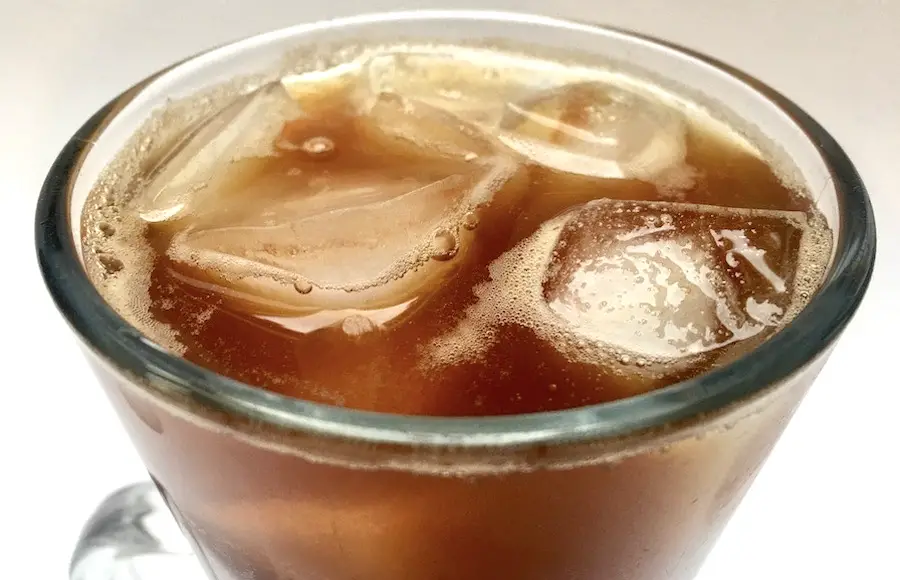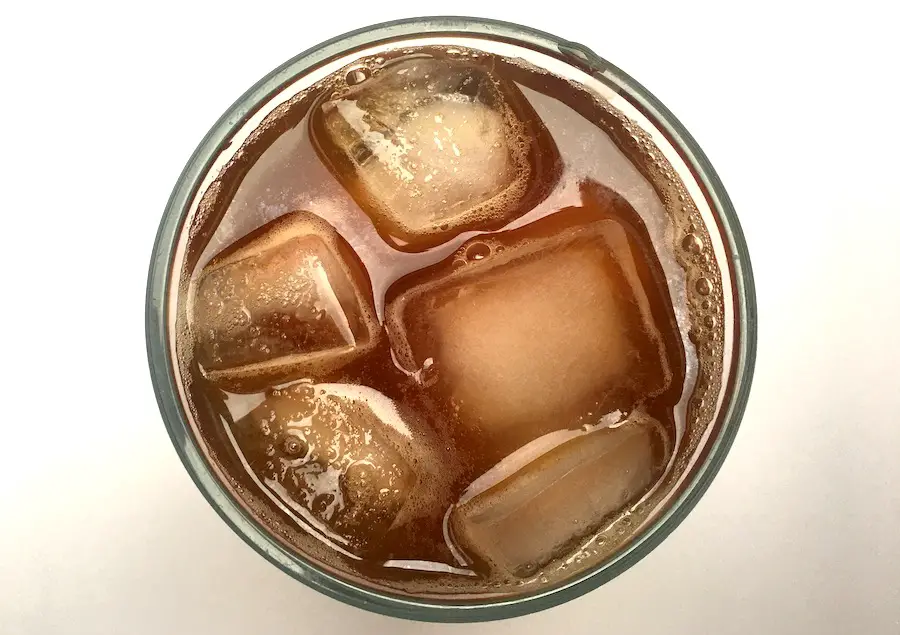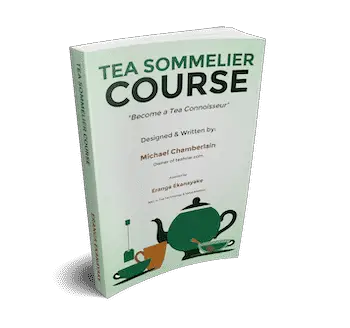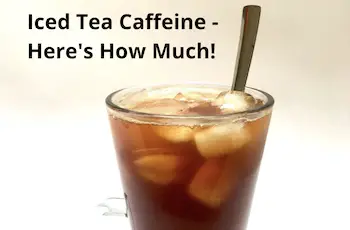I’ve written extensively about caffeine in many types of tea, here I’m extending that to one of the most popular teas in North America, and answering the question – does iced tea have caffeine.
If you’re wondering what iced tea actually is, then you should read my article explaining what iced tea is first.
Otherwise, when it comes to the caffeine levels, let’s start with a brief summary to get you a quick response, then I’ll go into why and how to reduce your caffeine levels when making your iced tea.
A traditional and authentic iced tea is made using black tea derived from the tea plant “Camellia Sinensis”, and so contains caffeine. On average a cup (8 fl oz) of iced tea has 47 mg of caffeine. However, this is still less than the average 80–100 mg of caffeine per (8 oz) cup of coffee.
To keep this as simple and clear as possible for you – we’ll focus mainly on the traditional iced tea – which is made using black tea, but I’ll cover related questions too for different varieties.
Iced tea is caffeinated
On average, a cup (8 fl oz) of iced tea has 47 mg of caffeine. Iced tea uses black tea as the main base. Black tea is a tea variety derived from the true tea plant “Camellia Sinensis”- and is one of the highest caffeine content teas.
What has more caffeine – coffee or iced tea?
Coffee contains more caffeine than iced tea. A typical 8 oz cup of coffee contains 80–100 mg of caffeine. This is much higher than the average 47 mg of caffeine in an average 8 oz cup of iced tea.
There are variables to this, of course, depending on how much black tea you add in your iced tea, the steeping time, the quality of the tea leaves, caffeinated vs decaf, and so on.
Also, here’s the difference between Iced tea and Sweet tea.

Does iced tea have more caffeine than hot tea?
This depends on the type of brewing and other factors. So to best answer this question, I’ve added a breakdown below of how they may differ – depending on either cold and hot brewing methods.
Cold brewed iced tea
In a cold brew, the tea leaves are added to the water when it’s cold.
Usually, this brewing method calls for the same amount of tea leaves that you would add to your usual hot tea beverage.
However, because the water is cold, the solubility of caffeine in the water is reduced. So steeping for 5-10 minutes or even an hour will not make your iced tea more caffeinated than hot tea.
But if you steep this tea for 7-8 hours, as is traditionally done with iced tea, then the tea will likely extract around 70% of caffeine.
In such a case, your cold brew could have the same amount of caffeine as hot tea.
What makes the caffeine content in cold brew vary is that the reduced solubility of caffeine in the cold water can be offset by the duration of the steep time.
Hot brewed iced tea
Hot brewing is where you brew the tea the same way as a hot tea and then pour it over ice to cool and water down the tea. Typically in this method, iced tea will have less caffeine than hot tea.
If you brew your hot tea using more tea leaves to make a more concentrated solution, then adding ice to water down to a cup – then this hot brewing method could have the same amount of caffeine as hot tea – or even more (depending on the concentration of your tea solution).
Remember that in hot brewed tea – hot water (near-boiling water) can extract around 80% of the caffeine when it’s left to steep for just 2 minutes.
So when you use more tea leaves to add better flavor to your iced tea, the caffeine levels won’t change even if you add ice over it.
And essentially, we’re talking about reasonable margins here, so it does have its effects. In fact, these effects have been shown in a study to decaffeinate green tea when hot water is used. Here’s the difference between temperature for the green tea and it’s caffeine levels…
Solubility of caffeine in green tea using hot and cold water.
| Temperature (°F / °C) | Caffeine Solubility % | |
| Cold water | 77 / 25 | 2.2 |
| Hot water | 212 / 100 | 66.7 |
So we can assume there will be similar effects when using black leaves in your iced tea. With regards to green tea, you can get lots more insight in my article on the caffeine levels in green tea.
Lipton iced tea has caffeine
Lipton iced tea is made from black tea leaves to keep the flavor as natural as possible – and so contains caffeine. It has 1.25 mg of caffeine per fl oz (4.23 mg per 100 ml) whereas a 20 fl oz bottle of Lipton iced tea has a total of 25 mg of caffeine.
But Lipton also has a diet iced tea version that is sugar-free and caffeine-free and has only 5 calories per serving
There are options for this version of Lipton iced tea on amazon if you wanted to give it a try?
You can also read more about the benefits of Lipton tea.
Powdered iced tea could contain higher levels
Like basic iced tea, powdered iced tea is made from black tea and therefore contains caffeine. However, powdered iced tea uses a fine powdered form of tea that is more concentrated. This means powdered iced tea could contain more caffeine than regular iced tea brewed using tea leaves.
Also, as powdered tea is in a finer form, the quantity of caffeine that could be released into the tea is higher, making it more caffeinated than the average given above.
Caffeine in Nestea iced tea
Nestea iced tea, (or Nestle in Europe) contains a caffeine content of around 23 mg – per 16 fl oz bottle. This is considered a lower caffeine level by tea standards.
Popular iced tea brands and their caffeine levels
To build on the last point, if you’re really looking at some popular iced tea brands, then here’s a list of four popular iced teas and their respective caffeine levels.
| Iced Tea (black) | Brand | Size (fl oz) | Caffeine level (per fl oz) |
| Sweet iced tea | Pure leaf | 18.5 fl oz bottle | 48 mg |
| lemon iced tea | Nestea | 8 fl oz | 15 mg* |
| Diet iced tea | Gold peak | 12 fl oz | 15 mg |
| Iced tea with lemon | Arizona | 8 fl oz | 15 mg |

How to reduce caffeine in iced tea
Here’s how to reduce your the levels when making your iced tea.
Use cold water
To reduce caffeine absorption into the water, look to use cold water of around 77°F (25°C) during steeping. This does also mean the tea will release fewer beneficial vitamins and minerals, but it will reduce caffeine levels.
Use fewer tea leaves
Simply reducing the amount of leaves, or the number of teabags you use for your iced tea brew will reduce the caffeine levels. This will result in a weaker tea solution but will help reduce caffeine.
Use decaf black tea
An obvious solution, use decaf black tea when making your iced tea. This does mean you do not need to use fewer leaves, but also means you can increase the temperature when brewing.
Make it herbal
Iced tea is traditionally made with black tea, but there are no exacting rules for steeping iced tea. You can look to make it as a herbal tea instead. For a number of reasons, herbal teas do not contain caffeine.
Caffeine in other teas
The type of tea you choose in your iced tea can affect the levels. You can learn more about caffeine levels in other types of teas, here’s a list of some of the popular ones, and other popular articles…
12 herbal teas to reduce bloating
Is iced tea considered a soft drink
More tea help
If you like tea, then you’ll love my tea sommelier course. It’s the fast-track way to improve your tea skills and knowledge and quickly become the go-to tea expert in your family or circle of friends – without sitting formal exams. Here’s some more information…

Take the fast track and become a tea connoisseur
Whether for enjoyment or considering a career as a tea sommelier. This course has everything you need to enhance your tea knowledge and tea-tasting skills.
This course keeps it simple with step-by-step tea tasting and easy reference guides
For pleasure, or as a precursor to a career in the tea industry. Find out what tea sommelier actually does, their career paths, and what they earn.

Find out more about the Teahow Tea Sommelier Course!
Find out more about the Teahow Tea Sommelier Course!
